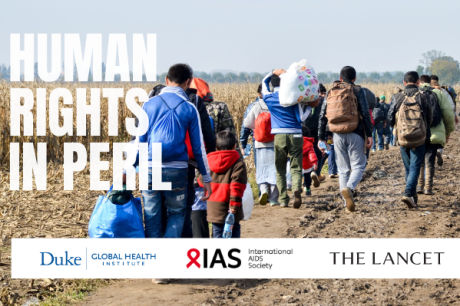
Scene from the small village of Mandena in northeastern Madagascar.
Published August 22, 2016, last updated on October 12, 2017 under Voices of DGHI
By Susan Gallagher, Sr. Communication & Marketing Specialist, DGHI
This spring, DGHI’s associate director of research, John Bartlett, said something that really stuck with me.
My colleague and I were filming a video series in which DGHI faculty members were dishing out advice to soon-to-be global health graduates, and one of John's nuggets of wisdom was, “The foundation of global health is in relationships ... this is where the joy of global health is.”
The idea of the centrality of relationships in global health wasn’t new to me. When I joined the DGHI communications team in 2014, I didn’t have any experience in the field of global health, but this revelation surfaced early as I acclimated to my new role, through conversations with professors, students and staff about their work. And speaking of John, I’ve always been struck by how he lights up when he talks about his long-time Tanzanian partners.

John Bartlett shares a laugh with Tanzanian partners Paschalis Rugarabamu, center, and Ahaz Kulanga.
But the way he articulated this idea so simply—and linked relationships not only to the effectiveness, but also to the enjoyment of his work—struck a chord. Makes sense: relationships bring us joy in all aspects of our lives, so why would global health be any different?
This summer, I witnessed this notion first-hand. I had the privilege of traveling to Mandena, a small village in northeastern Madagascar, to observe and document the work of a Bass Connections student research team that’s exploring the effects of traditional cooking practices on environmental and human health. (Stay tuned for the videos this fall!)

The team
Whether the students were going house-to-house conducting surveys, following villagers into the forest to observe their wood-cutting practices, carrying out health assessments in the village square or sitting around a table at their campsite debriefing on a morning’s work, they were weaving an intricate web of essential—and joyful—relationships.
There are the friendships they’d developed with each other—a team of undergraduates, master’s student, a PhD student and a medical student, hailing from different schools at Duke as well as other universities in Durham, Madagascar and Turkey. They’re students with a wide range of academic interests who were each attracted to the project for different reasons and who came with diverse but, in many cases, complementary perspectives on the challenges they’re trying to address.

Team members work together to address a problem.
Their fearless leaders, evolutionary anthropology and global health professor Charlie Nunn and 2016 Master of Science in Global Health alumna Melissa Manus, guided and mentored them, helping them integrate their individual interests into the broad goals of the project.

Charlie Nunn, right, and Melissa Manus, center, talk with team members.
There’s Des, a community member who has worked with researchers from DGHI and the Duke Lemur Center for several years. Des facilitates the research in a number of ways, from connecting the team with resources and people in Mandena, to serving as a translator, to helping researchers understand Malagasy culture, to making many more less-tangible but nonetheless critical contributions.
Simply put, I doubt this research could happen without Des.
And aside from assisting with the team’s research needs, Des has also opened his home to host the student team on his property for weeks on end, taken research teams on guided tours in the neighboring Marojejy National Park and become close friends with a number of Duke faculty members, staff and students.

Des, right, speaks to a crowd of community members (not pictured)
about the team's research project.
There’s Lahady, the registered nurse from Sambava, Madagascar, who helps the team conduct basic health assessments and offers advice and referrals to villagers who come to the outpost with questions and concerns about their cardiovascular health.

Lahady, second from left, assists one of the
team members during a health assessment.
There’s Prisca, the team’s translator from Andapa, Madagascar, who accompanies team members conducting household surveys.
There’s Charlie Welch, conservation coordinator at the Duke Lemur Center, and his colleagues, Marina Blanco and Lanto Andrianandrasana from the Duke Lemur Center’s SAVA Conservation initiative, a community-based project whose mission is to protect the forests and wildlife of northeastern Madagascar by working with local people. Marina and Lanto help the team with logistical matters such as acquiring groceries, planning travel and coordinating various activities.
There’s Seraphin, the campsite cook, who does wonders with beans and rice and shares smiles with the team members throughout each day.
And then, last but certainly not least, there are the community members themselves, who have warmly welcomed a Duke global health research team for two summers and inspired the young researchers to learn more about the local culture, people and language.

Team members and Prisca, the translator (second from right),
talk with community members outside their home.
My week in Mandena prompted me to reflect on a conversation I’d had with Charlie and Melissa earlier this summer, in which I asked them who their main community partners are in Mandena. They talked casually about many of the people mentioned above, but seemed to struggle a bit with this question. Their hesitation threw me off, as many of DGHI’s research projects are explicitly linked with a local community organization.
But after observing the team at work in Mandena, it all came together for me. Partners come in many forms—individuals, organizations, formal, informal—and each of these relationships help complete the puzzle and engender the joy that is global health.


